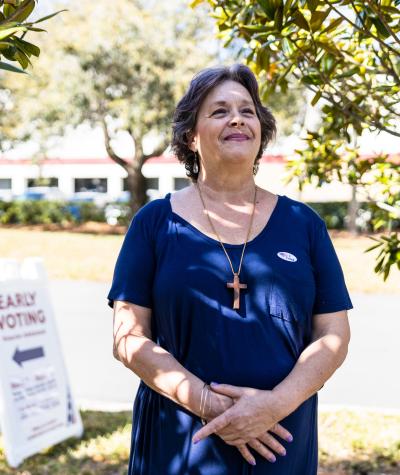A recently published study in Vanderbilt Law Review entitled “Felony Financial Disenfranchisement” found that contacting people with past felony convictions to let them know that they can vote and helping them pay off restitution, fines and fees significantly increases voter participation.
This study, conducted in Florida during the 2020 elections, shows how outreach by Campaign Legal Center’s (CLC) Restore Your Vote program has a significant impact on members of this group of voters, allowing more of them to be full, active participants in our democracy and use their freedom to vote to make their voices heard.
The study relied on data from a nonpartisan, nonprofit advocacy group called Free Our Vote, launched by the same researchers who created the study, to help Floridians restore their voting rights.
Free Our Vote identified eligible and potentially eligible voters in Florida in 2020 and partnered with Restore Your Vote, which conducted outreach to those individuals via mailers, social media advertising and text messages.
Specifically, the study focused on felony financial disenfranchisement, which requires those returning to society to pay fines, fees or restitution to regain the right to vote.
The study concluded that these modern-day poll taxes contribute to low voter turnout among those with past felony convictions by making the rights restoration process more complex and confusing. Often, people may not know whether they owe or need to pay fines, fees or restitution. Additionally, it presents a barrier to those who do not have the means to make these payments.
CLC’s and Free Our Vote’s joint efforts to inform voters who owed no fines and fees that they could vote grew turnout by roughly 16%. Meanwhile, voters who received debt relief through the program increased their turnout by around 26%.
Black voters were nearly half (47.9%) of registered voters in the study but comprised over two-thirds (66.9%) of people who owed fines, fees or restitution. Moreover, the average estimated income for people who owed court debt was $32,770, versus $37,991 for those who did not.
Due to the race and income-based gaps in who could have their voting rights restored, the study’s authors recommended eliminating the practice of felony financial disenfranchisement entirely.
The findings of this study demonstrate the importance of CLC’s efforts to ensure that discriminatory barriers do not prevent Floridians and voters in states across the country from completing the rights restoration process.
During the 2018 midterm elections, a resounding majority of Florida voters (65%) approved Amendment 4, which restored the right to vote to over one million citizens with past felony convictions.
Florida state legislators subsequently enacted a law that overturned the voters’ will by mandating that people with past felony convictions repay all fines, fees and restitution to qualify for voting rights restoration.
CLC mounted a legal challenge to this law behalf of Bonnie Raysor and others like her, claiming that it erected unconstitutional barriers to the right to vote and made it difficult or impossible for people with past convictions to determine their eligibility.
Despite a victory in the federal district court, an appeals court eventually ruled that the state of Florida could condition voting rights on an individual’s ability to pay.
However, CLC is still fighting for the voting rights of those with past felony convictions and currently has ongoing court cases in states like Alabama and Tennessee.
CLC is also helping the 24 million Americans with past felony convictions navigate difficult and confusing rights restoration processes in states around the country by giving direct assistance to individuals, working with community leaders to build sustainable rights restoration infrastructure in impacted communities and providing information through the online toolkit, RestoreYourVote.org.
Our democracy works best when every citizen can participate. Until this vision is realized, CLC will continue working to restore the right to vote to every American.
